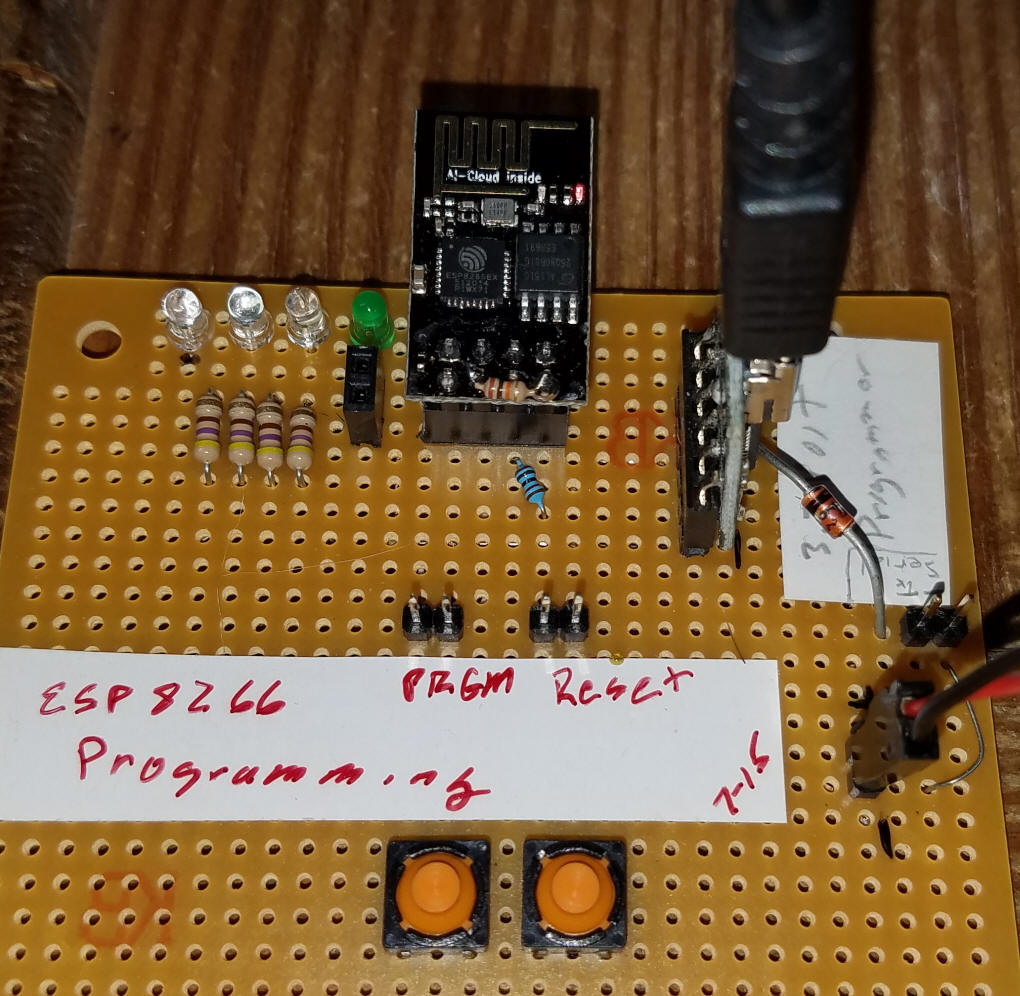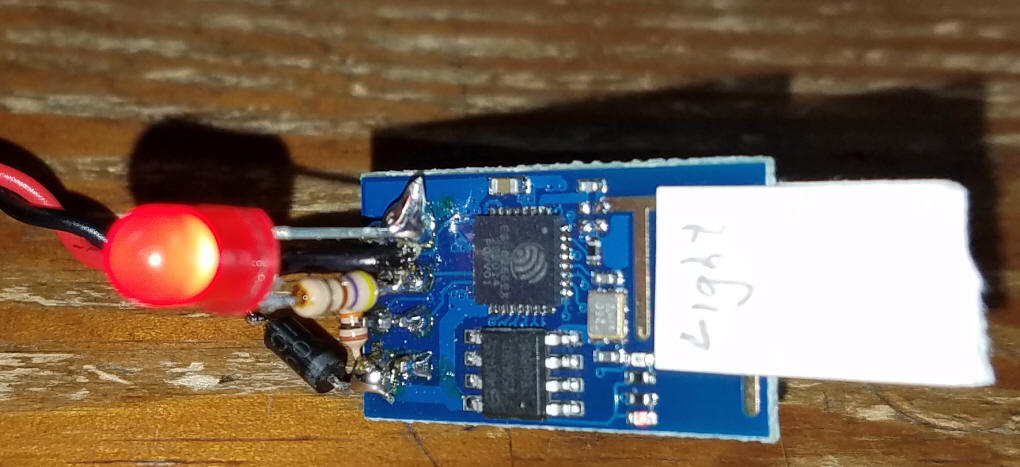| I have one of Amazon's voice activated
devices called a Tap. I have been experimenting with it to
turn on and off an LED connected to an ESP8266.
These are my notes on getting this to work. This is not meant to be a complete guide, just enough to remind me of what I have done so that I can duplicate it in the future. |
| This is the programming board that I have
built. It has several LEDs in the upper left, a USB to serial
programmer in the upper right and jumpers & buttons to activate
programming and to reset the ESP8266, The socket at the top
center holds the basic ESP8266 device. To program it with the
Arduino IDE the program jumper must be bridged (or the program
button pushed) and the reset must also be jumpered or pushed.
Once programming starts with the IDE release the reset button and,
once the dots start to display across the IDE showing that
programming has started, the program button can also be released.
|
| Once you get it working the ESP8266 can be wired directly to 3.3
volts (I used a 3.7 volt cell phone battery through a silicon diode)
and to a resistor and LED as shown here.
|
| To connect with the Amazon unit tell it to
"Discover Devices" With a little luck it should find the device named in your code (Arduino in my example) - to turn on the LED connected to GPIO 2 say "turn on Arduino"
|
The code is below - thanks to Torin Nguyen for the code
https://github.com/torinnguyen/ESP8266Wemo Note: you must modify the Arduino IDE to use this code - see: https://github.com/esp8266/arduino and https://hackaday.io/project/5150-arduino-ide-for-esp8266-quickstart-guide #include <ESP8266WiFi.h>
#include <ESP8266WebServer.h>
#include <WiFiUDP.h>
const char* ssid = "SSID"; // your network SSID (name)
const char* pass = "password"; // your network password
const char* friendlyName = "Arduino"; // Alexa will use this name to identify your device
const char* serialNumber = "221517K0101768"; // anything will do
const char* uuid = "904bfa3c-1de2-11v2-8728-fd8eebaf492d"; // anything will do
// Multicast declarations
IPAddress ipMulti(239, 255, 255, 250);
const unsigned int portMulti = 1900;
const unsigned int webserverPort = 9876;
// Witty Cloud Board specifc pins
const int LED_PIN = 2;
//-----------------------------------------------------------------------
//-----------------------------------------------------------------------
//int status = WL_IDLE_STATUS;
WiFiUDP Udp;
byte packetBuffer[512]; //buffer to hold incoming and outgoing packets
ESP8266WebServer server(webserverPort);
//-----------------------------------------------------------------------
// UDP Multicast Server
//-----------------------------------------------------------------------
char* getDateString()
{
//Doesn't matter which date & time, will work
//Optional: replace with NTP Client implementation
return "Wed, 29 Jun 2016 00:13:46 GMT";
}
void responseToSearchUdp(IPAddress& senderIP, unsigned int senderPort)
{
Serial.println("responseToSearchUdp");
//This is absolutely neccessary as Udp.write cannot handle IPAddress or numbers correctly like Serial.print
IPAddress myIP = WiFi.localIP();
char ipChar[20];
snprintf(ipChar, 20, "%d.%d.%d.%d", myIP[0], myIP[1], myIP[2], myIP[3]);
char portChar[7];
snprintf(portChar, 7, ":%d", webserverPort);
Udp.beginPacket(senderIP, senderPort);
Udp.write("HTTP/1.1 200 OK\r\n");
Udp.write("CACHE-CONTROL: max-age=86400\r\n");
Udp.write("DATE: ");
Udp.write(getDateString());
Udp.write("\r\n");
Udp.write("EXT:\r\n");
Udp.write("LOCATION: ");
Udp.write("http://");
Udp.write(ipChar);
Udp.write(portChar);
Udp.write("/setup.xml\r\n");
Udp.write("OPT: \"http://schemas.upnp.org/upnp/1/0/\"); ns=01\r\n");
Udp.write("01-NLS: ");
Udp.write(uuid);
Udp.write("\r\n");
Udp.write("SERVER: Unspecified, UPnP/1.0, Unspecified\r\n");
Udp.write("X-User-Agent: redsonic\r\n");
Udp.write("ST: urn:Belkin:device:**\r\n");
Udp.write("USN: uuid:Socket-1_0-");
Udp.write(serialNumber);
Udp.write("::urn:Belkin:device:**\r\n");
Udp.write("\r\n");
Udp.endPacket();
}
void UdpMulticastServerLoop()
{
int numBytes = Udp.parsePacket();
if (numBytes <= 0)
return;
IPAddress senderIP = Udp.remoteIP();
unsigned int senderPort = Udp.remotePort();
// read the packet into the buffer
Udp.read(packetBuffer, numBytes);
// print out the received packet
//Serial.write(packetBuffer, numBytes);
// check if this is a M-SEARCH for WeMo device
String request = String((char *)packetBuffer);
int mSearchIndex = request.indexOf("M-SEARCH");
int mBelkinIndex = request.indexOf("urn:Belkin:device:"); //optional
if (mSearchIndex < 0 || mBelkinIndex < 0)
return;
// send a reply, to the IP address and port that sent us the packet we received
responseToSearchUdp(senderIP, senderPort);
}
//-----------------------------------------------------------------------
// HTTP Server
//-----------------------------------------------------------------------
void handleRoot()
{
Serial.println("handleRoot");
server.send(200, "text/plain", "Tell Alexa to discover devices");
}
void handleSetupXml()
{
Serial.println("handleSetupXml");
String body = "<?xml version=\"1.0\"?>\r\n";
body += "<root>\r\n";
body += " <device>\r\n";
body += " <deviceType>urn:OriginallyUS:device:controllee:1</deviceType>\r\n";
body += " <friendlyName>";
body += friendlyName;
body += "</friendlyName>\r\n";
body += " <manufacturer>Belkin International Inc.</manufacturer>\r\n";
body += " <modelName>Emulated Socket</modelName>\r\n";
body += " <modelNumber>3.1415</modelNumber>\r\n";
body += " <UDN>uuid:Socket-1_0-";
body += serialNumber;
body += "</UDN>\r\n";
body += " </device>\r\n";
body += "</root>";
String header = "HTTP/1.1 200 OK\r\n";
header += "Content-Type: text/xml\r\n";
header += "Content-Length: ";
header += body.length();
header += "\r\n";
header += "Date: ";
header += getDateString();
header += "\r\n";
header += "X-User-Agent: redsonic\r\n";
header += "SERVER: Unspecified, UPnP/1.0, Unspecified\r\n";
header += "connection: close\r\n";
header += "LAST-MODIFIED: Sat, 01 Jan 2000 00:00:00 GMT\r\n";
header += "\r\n";
header += body;
Serial.println(header);
server.sendContent(header);
}
void handleUpnpControl()
{
Serial.println("handleUpnpControl");
//Extract raw body
//Because there is a '=' before "1.0", it will give the following:
//"1.0" encoding="utf-8"?><s:Envelope xmlns:s="http://schemas.xmlsoap.org/soap/envelope/" s:encodingStyle="http://schemas.xmlsoap.org/soap/encoding/"><s:Body><u:SetBinaryState xmlns:u="urn:Belkin:service:basicevent:1"><BinaryState>1</BinaryState></u:SetBinaryState></s:Body></s:Envelope>
String body = server.arg(0);
//Check valid request
boolean isOn = body.indexOf("<BinaryState>1</BinaryState>") >= 0;
boolean isOff = body.indexOf("<BinaryState>0</BinaryState>") >= 0;
boolean isValid = isOn || isOff;
if (!isValid) {
Serial.println("Bad request from Amazon Echo");
Serial.println(body);
server.send(400, "text/plain", "Bad request from Amazon Echo");
return;
}
//On/Off Logic
if (isOn) {
digitalWrite(LED_PIN, 1);
Serial.println("Alexa is asking to turn ON a device");
server.send(200, "text/plain", "Turning ON device");
}
else {
digitalWrite(LED_PIN, 0);
Serial.println("Alexa is asking to turn OFF a device");
server.send(200, "text/plain", "Turning OFF device");
}
}
void handleNotFound()
{
Serial.println("handleNotFound()");
String message = "File Not Found\n\n";
message += "URI: ";
message += server.uri();
message += "\nMethod: ";
message += (server.method() == HTTP_GET) ? "GET" : "POST";
message += "\nArguments: ";
message += server.args();
message += "\n";
for (uint8_t i=0; i<server.args(); i++) {
message += " " + server.argName(i) + ": " + server.arg(i) + "\n";
}
server.send(404, "text/plain", message);
}
//-----------------------------------------------------------------------
//-----------------------------------------------------------------------
void setup()
{
// Open serial communications and wait for port to open:
Serial.begin(115200);
Serial.println();
// Initialize LED pin
pinMode(LED_PIN, OUTPUT);
digitalWrite(LED_PIN, 0);
// setting up Station AP
WiFi.begin(ssid, pass);
// Wait for connect to AP
Serial.print("[Connecting to ");
Serial.print(ssid);
Serial.print("]...");
int tries=0;
while (WiFi.status() != WL_CONNECTED) {
delay(200);
Serial.print(".");
tries++;
if (tries > 50)
break;
}
// print your WiFi info
IPAddress ip = WiFi.localIP();
Serial.println();
Serial.print("Connected to ");
Serial.print(WiFi.SSID());
Serial.print(" with IP: ");
Serial.println(ip);
//UDP Server
Udp.beginMulticast(WiFi.localIP(), ipMulti, portMulti);
Serial.print("Udp multicast server started at ");
Serial.print(ipMulti);
Serial.print(":");
Serial.println(portMulti);
//Web Server
server.on("/", handleRoot);
server.on("/setup.xml", handleSetupXml);
server.on("/upnp/control/basicevent1", handleUpnpControl);
server.onNotFound(handleNotFound);
server.begin();
Serial.print("HTTP server started on port ");
Serial.println(webserverPort);
}
void loop()
{
UdpMulticastServerLoop(); //UDP multicast receiver
server.handleClient(); //Webserver
}
|

